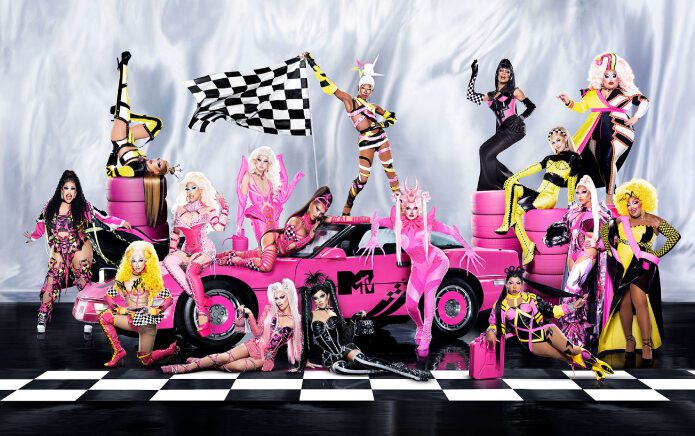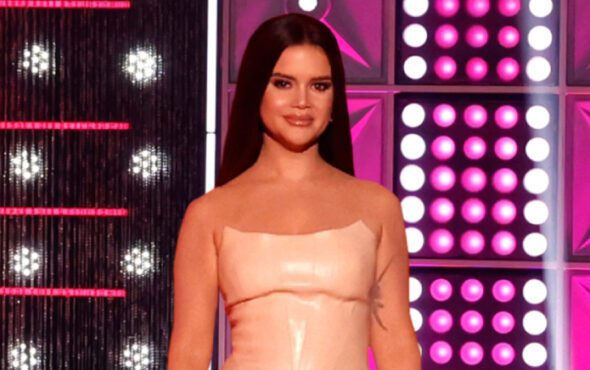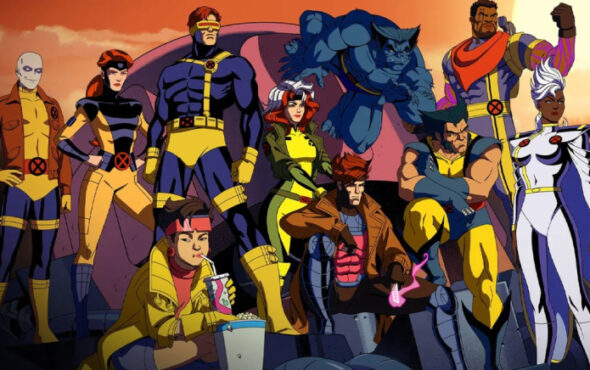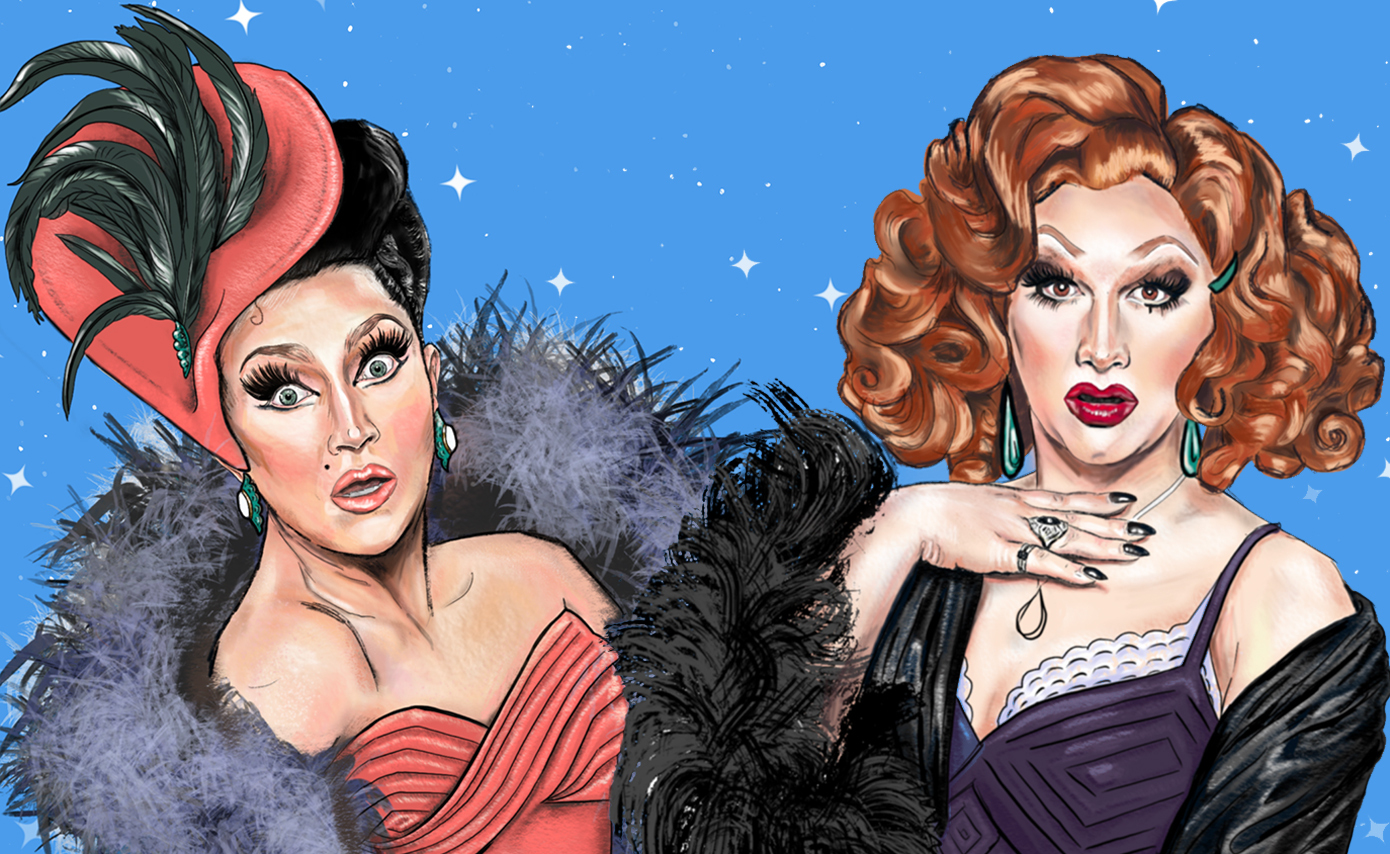
“Drag is an art-form that was born under adverse circumstances and flourishes under adverse circumstances,” says BenDeLaCreme, which couldn’t be closer to the truth in 2020. Since the start of lockdown, drag performers around the world have been using their invaluable skills to entertaint fans with performances online, whether that’s splitting, kicking, flipping or – in the case of DeLa and her Seattle sister, Jinkx Monsoon – (unintentionally) speaking to our current climate with a satirical and campy anthology podcast series inspired by 1940s radio.
It’s not the drag you’re used to gagging over in the club or the theatre (or every Friday on VH1), but trust us honey: it’s DRAG. With WQUR: Queer Quarantine Radio, Jinkx and DeLa – and their longtime comedy partners Peaches Christ and Major Scales – subvert old-time radio tropes with an array of oddball characters in farfetched situations while subtly drawing connections to the coronavirus pandemic. No, it hasn’t been done before.
“It’s interesting because they all came out of these tropes, but figuring that out after writing episode one really allowed us to find some fun, interesting and rich ways of addressing how I think we’re all feeling right now and what we’re concerned about,” explains DeLa. Jinkx adds: “These stories were definitely motivated by the circumstances. It wasn’t until the first episode came out and we had interviews, where people were telling us the things they saw within the stories, that we realised how much satire we had written.”
Drag is an art-form that was born under adverse circumstances and flourishes under adverse circumstances.
Over Zoom, we caught up with Jinkx and DeLa to discuss their thrilling new collaboration with Peaches and Major, their ideas for a movie adaptation and how drag queens will continue to thrive like cockroaches – even when the world goes to shit. There’s also some stuff in there about “poop splatters” – their words, not ours.
How is quarantine for Jinkx Monsoon and BenDeLaCreme?
DeLa: Surviving! It’s obviously a very crazy time and I’m very up and down, which I think a lot of people are. I would say that the life of an artist is generally so strange and we have to adjust to different circumstances, whether that’s touring, making work and presenting work. I think it’s just like, ‘Okay, well this is just a new phase,’ and fortunately, we have each other to work on things to keep us occupied. Also, to give us a good excuse to regularly check in and see each other’s faces and be in contact, which I think is really important for all of our mental health right now.
Jinkx: The phrase ‘count your blessings’ is so cliché and overdone, but I really felt that to be true throughout all of this. I feel very fortunate that audiences and my fanbase have been supportive through this and I’ve been trying to find ways to pay it forward. I don’t know what I’d do without the internet! I’d be screwed.
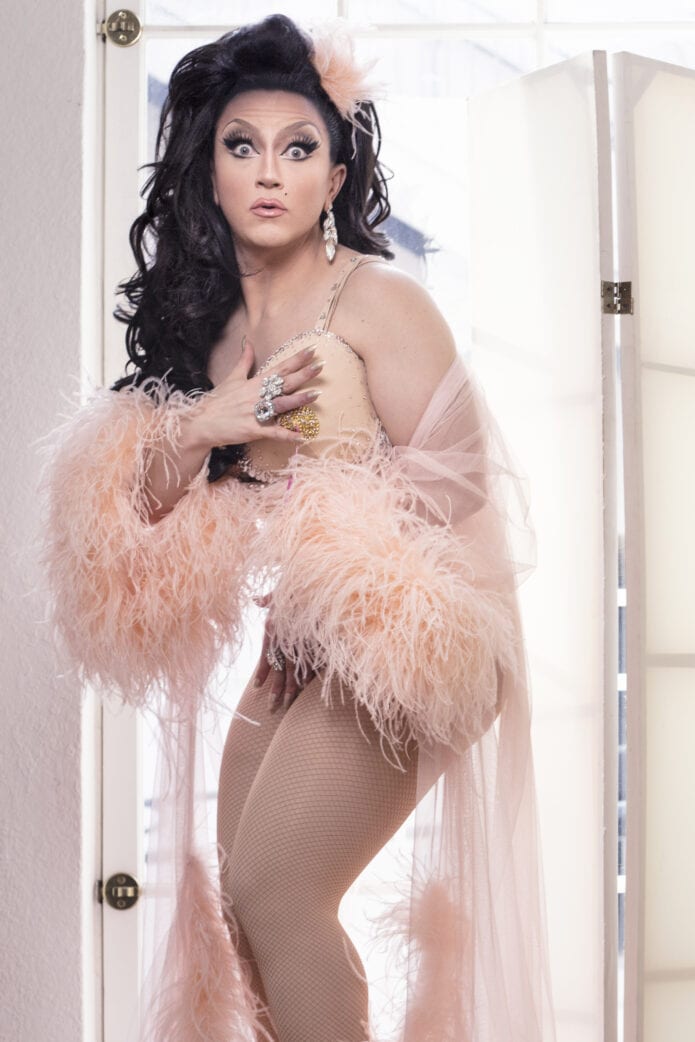
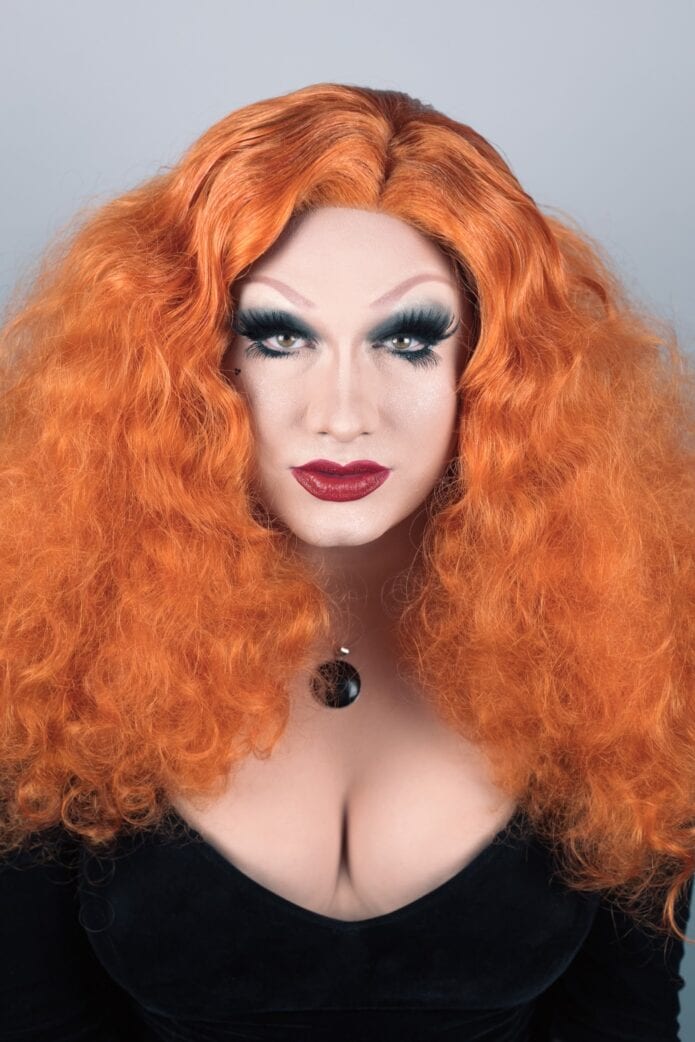
What does a ‘normal’ day-to-day look like for you both?
Jinkx: I try to space out the days of performing so that I’m not getting into drag every hour of my life! I’ve been doing a lot of baking, a lot of home repairs and just trying to make the most of being sequestered in my space. When you are working from home, self-motivation is a most tricky beast.
DeLa: I think a ‘normal day’ might be a thing of the past. I think all of my days look a little different, but I’ve been pretty occupied with projects, like Jinkx. It would be sort of easy to wake up every day, get into drag and start working, but I’ve been trying to be better about making those days long and productive. Then, having other days where I can practice human skills that I haven’t had in a long time – like cooking! We just moved to LA and so we’ve been trying to work on the house a lot. It’s those normal, domestic and mundane day-to-day activities that I envied for a very long time, because when you’re on the road living in hotels and airports, you don’t get to do the stuff that your 9-5 friends do that they all think is boring.
Jinkx: I have soul bonded with my cat, which has been a surprising turn of events. She’s a great cat, but there’s new thing where she won’t go into a room unless I’m there. She won’t go outside until I’m there and she’s stalking me throughout the house.
You released the first show of Queer Quarantine Radio in April, the start of lockdown – have these stories always been in your minds or did they come to fruition because of quarantine?
Jinkx: These stories were definitely motivated by the circumstances. DeLa and Peaches and Major and I all collaborate a lot, so when this all began, we realised that we were gonna have to create new work to keep ourselves busy during a time when we would normally be touring and performing live. We all immediately got on board with this radio show idea and the stories just kind of came to us. It wasn’t until the first episode came out and we had interviews, where people were telling us the things they saw within the stories, that we realised how much satire we had written. That really informed the way we wrote the second episode, and I’m really proud of the second episode because it shows the evolution in our writing, and it reflects how we are adapting to our circumstances right now.
DeLa: Yeah, we all work in satire a lot. Oftentimes, you write what you’re drawn to without worrying too much about why you’re drawn to it. You usually figure out afterwards why you were writing it and it’s frequently something in your subconscious that lights the way. Almost any time I’ve worked on an intense writing project like this, I’ve never quite understood why I’ve been pulled towards the topic or whatever. Even sometimes like a week or two later, I’ll look back at it and go, ‘Oh, this is what this was about.’ It was interesting, because we started writing these stories, one of which is the sitcom where the son is bringing on the end of times and the whole family is acting like nothing is happening. At the time, it seemed like a fun and silly spoof of that sitcom concept that existed more in the past than now, but now it’s clear that it’s about this frustration where people are ignoring what’s happening and not realising how dire our circumstances are. Darlington Mansion, looking back at it, becomes this lens of all these people feeling in danger as they’re trapped in this house, and nobody knows who is the cause of the danger. It’s interesting because they all came out of these tropes, but figuring that out after writing episode one – like Jinkx said – really allowed us to find some fun, interesting and rich ways of addressing how I think we’re all feeling right now and what we’re concerned about.
You’ve got Major’s music, DeLa’s wit, Peaches’ poop jokes… You can really tell who’s contributed to the piece!
When I listened to the podcast, I feel completely transported into this world, like a flashback? It’s quite surreal.
DeLa: I’m so glad you feel that way! We’ve been hearing a delightful amount of that. When we started this, we were just excited about this style of storytelling and we all write narrative scripts, so we were like, ‘How do we adapt to audio?’ There’s a lot of conversational podcasts out there, but that’s not exactly what we do. We were trying to figure out what it is we do, and we were excited about playing with this tool of radio play. It’s been really delightful to hear how many people are transported by it and feel almost comforted. I don’t know if any of us expected it to hit that way with people.
Jinkx: When we’re creating something, it’s always difficult to know what’s funny until you have an audience. Usually, we get to hear the laughter in the moment and follow that, you know? A lot of this is us working together and finally saying, ‘Well, we’ve listened to it so much, we have no idea if it’s funny or not, we just have to put it out in the world!’ It’s always a relief when people get my jokes, I guess. It’s always a relief when I put something out there and people actually laugh at it!
DeLa: It helps that the four of us really trust each other. We work so collaboratively on things, we’ll write a draft and then pass it onto someone else, who will then go through it and make some edits or add some jokes. By the time it makes the rounds between all four of us, we all know that we can edit each other’s work and trust each other enough to make it stronger. I do think that, even though we don’t have the benefit of learning through that audience reaction the way we usually do with a live show, we step up and do that for each other. It has been much more useful than if we were alone.
Jinkx: That process perfectly showcases our voices. I can hear all of us as creators in the performance and in the radio play. You’ve got Major’s music, DeLa’s wit, Peaches’ poop jokes… You can really tell who’s contributed to the piece!
DeLa: Those who know us really well and our work individually can listen and be like, ‘This sounds like a Jinkx thing,’ or ‘This sounds like a Peaches thing.’ I think the styles are blended together so well that, even those who know our styles super well, would not see the edges. The four of us have really found our voice. It is our collective voice, and that’s a really fun and exciting way to work.
Jinkx: It’s like we are all part of the board from Star Trek.
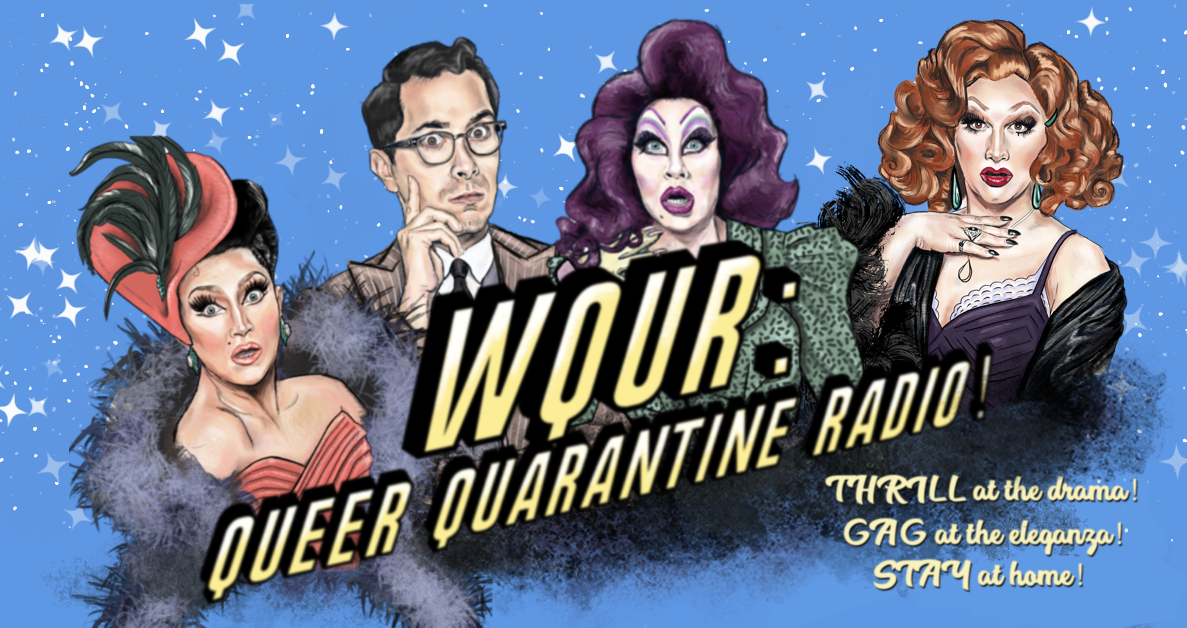
So, which one of you has to be put on a leash? Who’s the crazy one?
DeLa: Part of the benefit of how we all work is that we trust each other in this way where we let each other go and follow those journeys. I’m not sure if anyone has put a cap on anyone else!
Jinkx: The only time there has been any negotiations on something was DeLa finesse-ing a line about a man peeing into the mouth of another man.
DeLa: [Laughs] That’s true.
Jinkx: The joke remained, but it had been finessed so that everyone involved was happy. That’s not the first time that DeLa has had to negotiate with Peaches, where she’s like, ‘I’ll give you either 12 poop splatters or 14 poop splatters, but it can’t be seven or 20 poop splatters.’ They get down to the number of splatter effects that you can use in a poop joke.
DeLa: That’s true, I hadn’t thought of that. That’s the one time, but I also think that any time Peaches is writing a joke for me, she writes it way way way farther than she wants it go because she knows that I’ll meet her somewhere in the middle, and that’s how she’s gonna get me to say something really filthy.
Do you think these stories could be adapted for the stage one day? Or film, television?
DeLa: We’ve talked about that a lot. I think so! Everything is so unknown right now, that everybody is riding the wave of what happens next and adapting. We’ve certainly talked about how these particular projects could be adapted and how natural that would feel. Peaches, specifically, her background is in film and she’s a filmmaker, as well as a stage/theatre-maker. We’ve got somebody who really speaks to this cinematically, and we’ve discussed what that might look like. The rest of us as well, all four of us really, we do so much work on stage. Part of what’s special about them is that they couldn’t exist on stage with just the four of us, because we all play so many characters that are so different, which is one reason why I think it work well on film. But, no matter what life this continues to have, I think it will still feel really fresh and different.
We’re like cockroaches. When this is all over, the drag queens will come scuttling out of the shadows and take over!
Jinkx: There’s nothing as fresh and different like 1940s-styled performance art!
DeLa: [Laughs] Right? But all we hear constantly from people is, ‘Oh my gosh, this is so different from anything else we’re hearing.’ I think that’s a testament to the fact that an important part of being a performer and a drag queen and all of these things is knowing your history and knowing your past. It’s always useful to pull from the past, and in an age where I think drag sometimes exists in a contemporary vacuum, where we’re all referencing what the drag queen of the moment is, I think the success of this is a good reminder that there’s a lot of good art that’s been made in the past that we can all be pulling from.
How do you think the art of drag can help people through quarantine?
DeLa: I think the spirit of drag is the most important part of drag, where it comes from and represents, and I’ve been thinking about it a lot. Drag is really an art-form that was born under adverse circumstances and flourishes under adverse circumstances. Drag was refined and grew in the way that it did in a much more niche, hidden subculture, before queer people had the acceptance that they have today. Because of that, drag queens have created themselves out of problem solving. It’s like, how do we make something fabulous even though our circumstances are not great, even though we don’t have access to certain things? Now we see a lot of drag queens with costumes that cost $1000, and in a different era, drag queens had to figure out how to make their curtains into something ball-worthy. We’re back there now, and so I think that drag queens are uniquely qualified to figure out how to make something fabulous, beautiful and fun out of these bizarre times. It’s all about creative problem solving that leads to something magical.
Jinkx: I can sum up the way I feel about it, which is exactly the same way. When quarantine started and we all started taking to online performances, Alaska said, ‘We will find a way to survive this because drag queens survive everything.’ I said, ‘Yeah, we’re like cockroaches that way. When this is all over, the drag queens will come scuttling out of the shadows and take over!’
The first two episodes of WQUR: Queer Quarantine Radio are now available to stream.
